
Pope Benedict XVI is scheduled to leave tomorrow morning on a 9:00 o'clock flight from Rome's Fiumicino Airport to Ankara, Turkey. Thus will begin the Pope's long anticipated visit to this country in a Muslim world in many ways ill-disposed to receive him. Shouting "Allahu akbar!" Muslim
protestors occuppied the Hagia Sophia in Instanbul on Wednesday, Nov. 22nd, to protest the Pope's visit. On Thursday, Nov. 23rd, the Anatolia news agency reported that "Two men who converted to Christianity went on trial Thursday for allegedly insulting 'Turkishness' and inciting religious hatred against Islam" ("
Christian converts on trial in Turkey").

Yesterday (Sunday, Nov. 26th), more than
25,000 people joined demonstrations against Pope Benedict XVI's upcoming visit, with
4,000 police backed by riot trucks, armored vehicles and helicopters monitoring crowds ("
25,000 Protest Pope's Visit to Turkey," ABC News International, Nov. 26, 2006). (
La Stampa has a live video clip of local protests in Istanbul today: "
Il Papa in Turchia: le proteste locali.")
In its cover story of Nov. 19th,
Time magazine's David Van Biema writes:
For the traveling Pontiff, it was not a laid-back Turkish holiday. The citizens of the proud, predominantly Muslim nation had no love of Popes. To the East, the Iranian government was galvanizing anti-Western feeling. The news reported that an escaped killer was on the loose, threatening to assassinate the Pontiff when he arrived.  Yet the Holy Father was undaunted. "Love is stronger than danger," he said. "I am in the hands of God." ... He enjoined both Christians and Muslims to "seek ties of friendship with other believers who invoke the name of a single God."
Yet the Holy Father was undaunted. "Love is stronger than danger," he said. "I am in the hands of God." ... He enjoined both Christians and Muslims to "seek ties of friendship with other believers who invoke the name of a single God."
That was 1979 and Pope John Paul II. But when Benedict XVI travels to Turkey ... on his first visit to a Muslim country since becoming Pope last year, he is unlikely to cloak himself in a downy banner of brotherhood, the way his predecessor did 27 years ago. Instead, Benedict, 79, will arrive carrying a different reputation: that of a hard-knuckle intellect with a taste for blunt talk and interreligious confrontation. Just 19 months into his tenure, the Pope has become as much a moral lightning rod as a theologian; suddenly, when he speaks, the whole world listens. And so what takes place over four days in three Turkish cities has the potential to define his papacy--and a good deal more. "The Passion of the Pope" (Time, Nov. 19, 2006)
It will be recalled that the Grand Mufti of the Palestinian Territories, Sheikh Mohammad Hussein, said the Pope must make "a personal and clear apology to 1.5 billion Muslims in this world for the insult caused by his lecture [in Regensburg] ..." ("
Pope faces Muslim calls for unequivocal apology," Free Republic, 9/19/06)
Last month, two Turks hijacked a Turkish airliner carrying 113 passengers to protest the pope's visit to Turkey ("
Turks hijack airliner to protest pope's visit," Chicago Sun Times, Oct. 3, 2006)
Mehmet Ali Agca, the man who is serving a life sentence (now in Turkey) for the attempted assassination of Pope John Paul II in May 1981, has written to Pope Benedict XVI from jail, warning him not to go to Turkey as planned. In a letter to an Italian daily newspaper, he addressed the Pope ominously: "Your life is in danger. You absolutely must not come to Turkey." ("
Papal assassin warns Pope Benedict his 'life is in danger' if he visits Turkey," thisislondon.co.uk, London, 9/20/06)
This morning's London Telegraph carries the headline article, "
Pope death threats put Turkey on high alert" (Telegraph.co.uk, Nov. 27, 2006), reporting: "An army of snipers, riot police, secret agents and bomb disposal experts has been mobilised for the Pope's four-day visit to Turkey.

Naval units will patrol the Bosphorus armed with machine guns after warnings to police and security services that the life of Benedict XVI may be threatened by Islamic extremists after he arrives on Tuesday."
Finally, Adnkronos International (AKI) reports that "
Sales of Pope Murder Book Soar Ahead of Benedict XVI's Visit," referring to a book by Yuvel Kaya entitled
The Plot Against the Pope -- "a highly speculative potboiler narrating how the conservative Roman Catholic society Opus Dei, a subversive masonic lodge and the CIA collude to make the pontiff's murder a pretext for a US attack against Iran."
The Pope's ItineraryThe Vatican has released
the full schedule for Pope's visit to Turkey (Nov. 13, CWNews.com), which is set for November 28 - December 1, 2006:
The high point of the papal voyage remains the Holy Father's meeting with the Orthodox Patriarch Bartholomew I of Constantinople (pictured below, right). But during his stay the Pontiff will also meet with Turkish government officials and with other religious officials including Muslim, Jewish, and Armenian clerics as well as leaders of the country's small Catholic community.
November 28The Pope will leave Rome's Fiumicino airport on Tuesday morning, November 28, for a 9 o'clock flight to Ankara, arriving there at Esenboga airport early in the afternoon. He will travel immediately to the mausoleum of Kemal Ataturk, the founder of modern Turkey, and later pay courtesy call on President Necdet Sezer. (In a break from the usual protocol, the Turkish government leader will not meet the Pope's plane at the airport.) Later the Pope will meet with other top government officials, including the deputy prime minister and the minister for religious affairs.
 November 29
November 29On November 29, Pope Benedict will celebrate Mass at Ephesus, the site of St. Paul's missionary work. Then he will travel to Istanbul, to be received by Patriarch Bartholomew (pictured right) at the patriarchal church of St. George.
November 30November 30 is the feast of St. Andrew, the patron saint of the Constantinople see. The Roman Pontiff will join the Ecumenical Patriarch in a liturgical celebration, and then the two are expected to sign a joint statement.
That afternoon, the Pope will visit the Hagia Sophia: once a Christian basilica, later a mosque, and now a national museum. Then he will visit the city's Armenian cathedral, for a meeting with Armenian Apostolic Patriarch Mesrop II. Later he will meet the local leaders of the Syrian Orthodox, Jewish, Evangelical, and Muslim communities. He is scheduled to have dinner with the country's Catholic bishops.
 November 31
November 31On Friday morning the Pope will celebrate Mass in Istanbul's Catholic cathedral of the Holy Spirit.
December 1His Holiness will celebrate Mass at the Cathedral of the Holy Spirit; then head for the airport for a farewell ceremony and 13:15 departure from the Airport of Istanbul for Rome. Deo volente, that evening will find him safely home in Rome.
For further details, see the substantial synopsis of related news items posted by Christopher Blosser at
Against the Grain under the title of
Anticipating Benedict's Papal Visit to Turkey (Nov.24, 2006), with continuing updates.
Update 11/28/06- CHANGE OF PLANS: TURKISH PREMIER WILL GREET POPE: Nov. 27 (CWNews.com) - In a noteworthy reversal of policy, the Turkish government has announced that Prime Minister Tayyip Erdogan will greet Pope Benedict XVI when the Pontiff arrives in Ankara on November 28. The Vatican warmly welcomed the move, saying it was a "much appreciated... gesture of attention."
- VATICAN ANNOUNCES PAPAL VISIT TO MOSQUE, AS TURKS CONTINUE TO PROTEST: Vatican City, Nov. 27, 2006 (CNA) - In what is being reported as an attempt to “ease Muslim anger” by the Turkish press, Pope Benedict XVI will visit Istanbul’s famed Blue Mosque (Sultanahmet) -- which stands in a square of the same name in the historical district of Istanbul, opposite the “Aya Sofya” (or Hagia Sophia) museum -- during his visit to Turkey this week. Vatican Press Office director Fr. Federico Lombardi confirmed Sunday that Benedict will pay a short visit to the mosque on Nov. 30, the same day he is scheduled to visit the Hagia Sophia, which was converted to a mosque and is now a museum.

 Today the Pope celebrated Mass in
Today the Pope celebrated Mass in 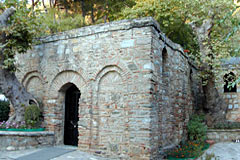 Ephesus was one of the "
Ephesus was one of the " Mass at the “House of Mother Mary” with a group of Turkish Christians. The Pontiff spoke of “Christ, our peace,” and pleaded for peace in the world. Amid strict security, to protect the Holy Father from threatening assassins, Pope Benedict returned to the themes of peace and religion, speaking not of Islam, but of Christianity. Drawing from Paul’s letter to the Church in Ephesus, the Pope emphasized the motto of his trip to Turkey, "He, Christ, is our peace" (Eph 2:14).” “Mary’s divine motherhood and her ecclesial motherhood are thus inseparably united,” Pope Benedict concluded. “Mary teaches us that the source of our joy and our one sure support is Christ, and she repeats his words: ‘Do not be afraid’ (Mk 6:50), ‘I am with you’ (Mt 28:20). To the strength of his arm let us entrust ourselves (cf. Lk 1:51). Mary, Mother of the Church, accompany us always on our way! Holy Mary, Mother of God, pray for us!” Following the celebration of the Mass the Holy Father traveled from Izmir to Istanbul where he is meeting the Ecumenical
Mass at the “House of Mother Mary” with a group of Turkish Christians. The Pontiff spoke of “Christ, our peace,” and pleaded for peace in the world. Amid strict security, to protect the Holy Father from threatening assassins, Pope Benedict returned to the themes of peace and religion, speaking not of Islam, but of Christianity. Drawing from Paul’s letter to the Church in Ephesus, the Pope emphasized the motto of his trip to Turkey, "He, Christ, is our peace" (Eph 2:14).” “Mary’s divine motherhood and her ecclesial motherhood are thus inseparably united,” Pope Benedict concluded. “Mary teaches us that the source of our joy and our one sure support is Christ, and she repeats his words: ‘Do not be afraid’ (Mk 6:50), ‘I am with you’ (Mt 28:20). To the strength of his arm let us entrust ourselves (cf. Lk 1:51). Mary, Mother of the Church, accompany us always on our way! Holy Mary, Mother of God, pray for us!” Following the celebration of the Mass the Holy Father traveled from Izmir to Istanbul where he is meeting the Ecumenical  Patriarch Bartholomew I.
Patriarch Bartholomew I. and Turkey's chief Islamic cleric said at a joint appearance that growing "Islamophobia" hurts all Muslims. "The so-called conviction that the sword is used to expand Islam in the world and growing Islamophobia hurts all Muslims," Bardakoglu said at a joint appearance. Benedict also said guarantees of religious freedom are essential for a just society. His comments could be reinforced later during the four- day visit when the pope meets in Istanbul with Ecumenical Patriarch Bartholomew I, the spiritual leader of the world's Orthodox Christians. The pope is expected to call for greater rights and protections for Christian minorities in the Muslim world, including the tiny Greek Orthodox community in Turkey.
and Turkey's chief Islamic cleric said at a joint appearance that growing "Islamophobia" hurts all Muslims. "The so-called conviction that the sword is used to expand Islam in the world and growing Islamophobia hurts all Muslims," Bardakoglu said at a joint appearance. Benedict also said guarantees of religious freedom are essential for a just society. His comments could be reinforced later during the four- day visit when the pope meets in Istanbul with Ecumenical Patriarch Bartholomew I, the spiritual leader of the world's Orthodox Christians. The pope is expected to call for greater rights and protections for Christian minorities in the Muslim world, including the tiny Greek Orthodox community in Turkey.  "I want to express happiness to see you and your delegation in our country," Erdogan told the Pope. He described the Pope's visit as "very meaningful."
"I want to express happiness to see you and your delegation in our country," Erdogan told the Pope. He described the Pope's visit as "very meaningful." Pope Benedict XVI is scheduled to leave tomorrow morning on a 9:00 o'clock flight from Rome's Fiumicino Airport to Ankara, Turkey. Thus will begin the Pope's long anticipated visit to this country in a Muslim world in many ways ill-disposed to receive him. Shouting "Allahu akbar!" Muslim
Pope Benedict XVI is scheduled to leave tomorrow morning on a 9:00 o'clock flight from Rome's Fiumicino Airport to Ankara, Turkey. Thus will begin the Pope's long anticipated visit to this country in a Muslim world in many ways ill-disposed to receive him. Shouting "Allahu akbar!" Muslim  Yesterday (Sunday, Nov. 26th), more than 25,000 people joined demonstrations against Pope Benedict XVI's upcoming visit, with 4,000 police backed by riot trucks, armored vehicles and helicopters monitoring crowds ("
Yesterday (Sunday, Nov. 26th), more than 25,000 people joined demonstrations against Pope Benedict XVI's upcoming visit, with 4,000 police backed by riot trucks, armored vehicles and helicopters monitoring crowds (" Yet the Holy Father was undaunted. "Love is stronger than danger," he said. "I am in the hands of God." ... He enjoined both Christians and Muslims to "seek ties of friendship with other believers who invoke the name of a single God."
Yet the Holy Father was undaunted. "Love is stronger than danger," he said. "I am in the hands of God." ... He enjoined both Christians and Muslims to "seek ties of friendship with other believers who invoke the name of a single God."  Naval units will patrol the Bosphorus armed with machine guns after warnings to police and security services that the life of Benedict XVI may be threatened by Islamic extremists after he arrives on Tuesday."
Naval units will patrol the Bosphorus armed with machine guns after warnings to police and security services that the life of Benedict XVI may be threatened by Islamic extremists after he arrives on Tuesday." BOSTON (CNS) -- Evidence of an alleged miraculous cure in the Archdiocese of Boston attributed to the intercession of Cardinal John Henry Newman has been sent to the Congregation for Saints’ Causes in Rome.
BOSTON (CNS) -- Evidence of an alleged miraculous cure in the Archdiocese of Boston attributed to the intercession of Cardinal John Henry Newman has been sent to the Congregation for Saints’ Causes in Rome. Cardinal Newman, prolific as a poet, essayist and novelist, and renowned as a preacher, was best known as a theologian. He made important original contributions in the development of doctrine, in the role of people’s belief in discerning truths of faith and in a carefully-nuanced understanding of papal infallibility.
Cardinal Newman, prolific as a poet, essayist and novelist, and renowned as a preacher, was best known as a theologian. He made important original contributions in the development of doctrine, in the role of people’s belief in discerning truths of faith and in a carefully-nuanced understanding of papal infallibility.

 ROME, NOV. 17, 2006 (
ROME, NOV. 17, 2006 (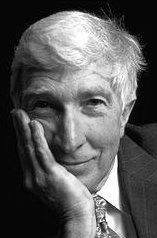 Last night I went to hear John Updike who spoke at Lenoir-Rhyne College in this semester's visiting writers series. I had read a number of his novels and other works back in my college years and, since I had never heard him speak in person, I was pleased to see that several decades had not diminished any of the spry wit that pervaded his writings.
Last night I went to hear John Updike who spoke at Lenoir-Rhyne College in this semester's visiting writers series. I had read a number of his novels and other works back in my college years and, since I had never heard him speak in person, I was pleased to see that several decades had not diminished any of the spry wit that pervaded his writings. 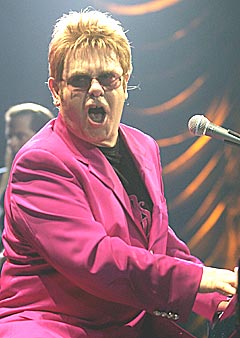 In his
In his  faith that one will discover what it is that fulfills "the deepest longings of the human heart."
faith that one will discover what it is that fulfills "the deepest longings of the human heart." Over the weekend, we received the following report from our undercover field agent in Seattle working with our team of ecclesiastical Mystery Shoppers for Mary. Like 'mystery shoppers' anywhere, MWMs conduct routine clandestine assessments of liturgical form in various parishes throughout the United States and report back to Pertinacious Papist Central (PPC). Despite our field agent's reassurances about the love of Starbuck-sipping Seattleans for Sacred Tradition, bear in mind that this assignment in the former Archdiocese of Raymond Hunthausen was no cakewalk. He decidely placed his life and the lives of his family members in harm's way in carrying out this assignment, and for that we owe him and his loved ones our undying gratitude. (For that reason, we have also cloaked his identity, and, if worst comes to worst, we also have a witness protection and resettlement program, although we can't promise there won't be bongo Masses and yahoo liturgies.) Here, then, is our field agent's report:
Over the weekend, we received the following report from our undercover field agent in Seattle working with our team of ecclesiastical Mystery Shoppers for Mary. Like 'mystery shoppers' anywhere, MWMs conduct routine clandestine assessments of liturgical form in various parishes throughout the United States and report back to Pertinacious Papist Central (PPC). Despite our field agent's reassurances about the love of Starbuck-sipping Seattleans for Sacred Tradition, bear in mind that this assignment in the former Archdiocese of Raymond Hunthausen was no cakewalk. He decidely placed his life and the lives of his family members in harm's way in carrying out this assignment, and for that we owe him and his loved ones our undying gratitude. (For that reason, we have also cloaked his identity, and, if worst comes to worst, we also have a witness protection and resettlement program, although we can't promise there won't be bongo Masses and yahoo liturgies.) Here, then, is our field agent's report: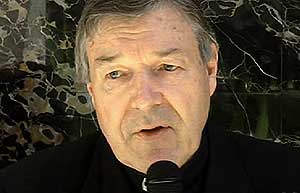 Back in its June/July issue, First Things published an essay on Islam by George Cardinal Pell of the Archdiocese of Sydney, Australia. Finally available online, the article, entitled, "
Back in its June/July issue, First Things published an essay on Islam by George Cardinal Pell of the Archdiocese of Sydney, Australia. Finally available online, the article, entitled, "
 On October 24, 2005 -- yes, that's over a year ago -- I spent four hours in an emergency room getting four stitches in my hand, a tetanus shot, and a prescription for Hydrocodone pain medication after slicing a third-of-an-inch deep, one-inch long gash in my hand opening a tin of 9 Lives cat food. Now, mind you, I'm not an altogether careless guy, yet this wasn’t the first time I cut my hand opening a can 9 Lives cat food. Once before I sliced my finger but the wound wasn’t as deep and I avoided the emergency room by means of a home-made bandage that I changed daily for a couple of weeks.
On October 24, 2005 -- yes, that's over a year ago -- I spent four hours in an emergency room getting four stitches in my hand, a tetanus shot, and a prescription for Hydrocodone pain medication after slicing a third-of-an-inch deep, one-inch long gash in my hand opening a tin of 9 Lives cat food. Now, mind you, I'm not an altogether careless guy, yet this wasn’t the first time I cut my hand opening a can 9 Lives cat food. Once before I sliced my finger but the wound wasn’t as deep and I avoided the emergency room by means of a home-made bandage that I changed daily for a couple of weeks.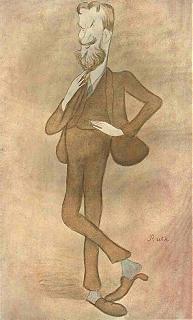 You've got to love these 'soft' insults traded by Shaw and Churchill:
You've got to love these 'soft' insults traded by Shaw and Churchill: